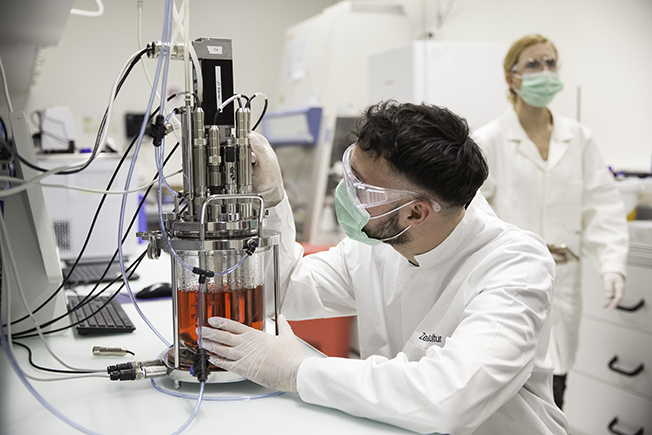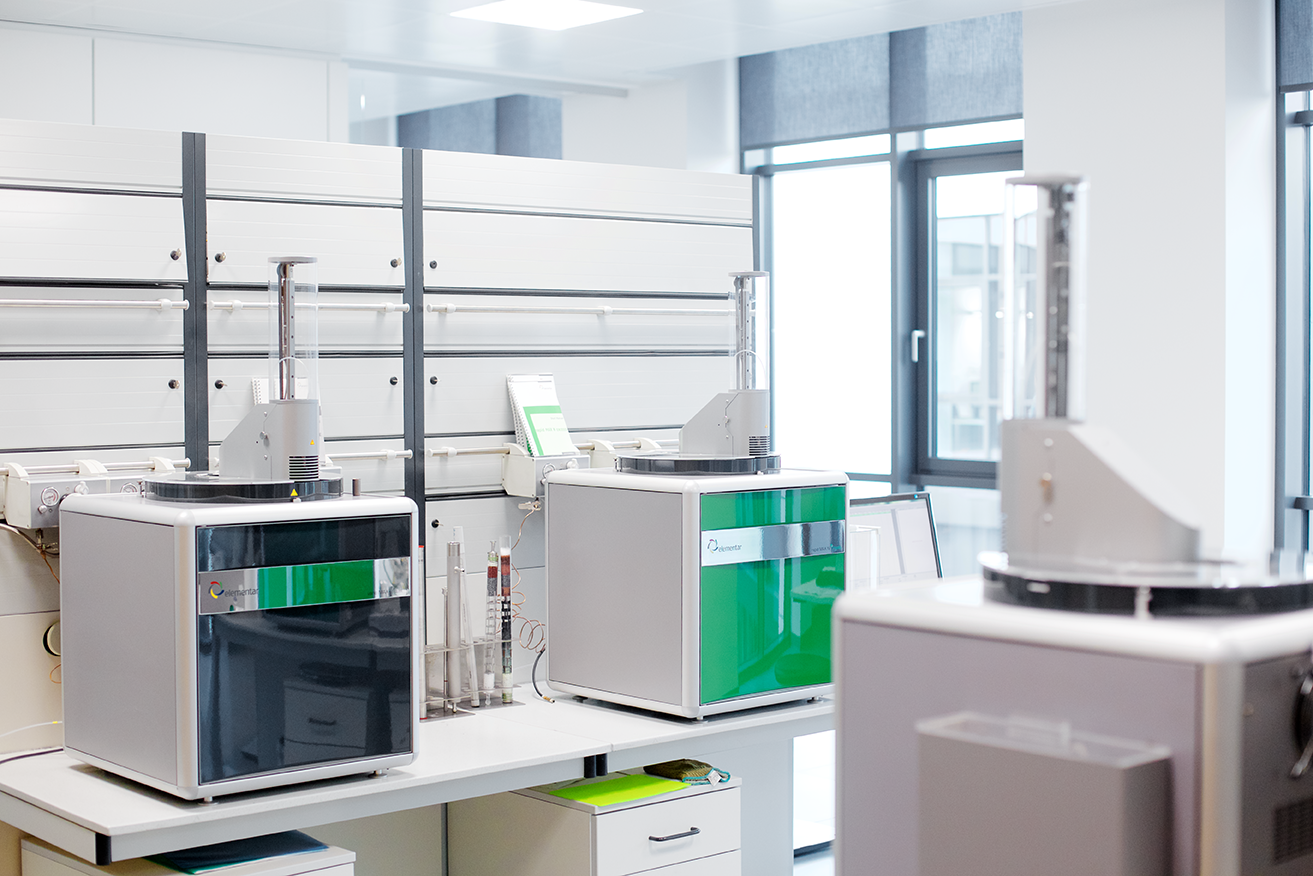

Production technology for a great variety of vegan sausage types
Sausages are second only to veggie burgers as the most popular vegan meat – hence advanced processing technologies need to help manufacturers keep up with demand as well as the wide variety of sausage types demanded by consumers
Handtmann develops and produces modular system technology for food production, including alternative protein products. These modular process solutions are flexible and suitable for the portioning, forming, co-extrusion and depositing of a wide range of products and consistencies of alternative proteins.

The variety of vegan sausage products available on the market today is vast and can be roughly categorized into vegan sausages, vegan cold cuts and vegan spreads. Aside from the typical meat substitute products such as vegan fried sausage, liver sausage or salami cold cuts, there is also an increasing demand for new products that explicitly do not have a look and feel of meat, such as sausage products based on mushrooms, vegetables, tofu, mycoprotein or seitan, plant-based protein concentrates, isolates and texturates or other hydrocolloids.
For the production of vegan sausages, Handtmann offers technologies that include vacuum fillers, ultra-fine grinders, cutters and grinding systems, mixers, sausage lines and depositing systems. These process solutions can optionally be operated with inline grinding systems and combined with various automation and handling systems.
Optimal interplay of product and process solution
The quality of a vegan sausage is already defined during the production of the initial product. The consistency and temperature of the vegan product must be suitable for the subsequent process steps, because maximum product quality can only be achieved and efficiently produced if the product characteristics and the technology applied are correctly matched. Handtmann supports these goals with suitable process solutions and expertise including in-depth information and product-specific adjustments.

VarioMix technology for mixing and emulsifying
In the production of vegan sausages, water, proteins, fat, hydrocolloids, salt, spices, flavorings and colorants are used to produce an emulsion that gels after heating. Other stabilization systems exist that gel cold and do not require a heating step. The aim of the mixing process is to produce a stable, homogeneous emulsion of a consistency suitable for the subsequent portioning process.
This is achieved by adding ingredients with an emulsifier effect as well as thickening agents.
The preparation of a stable emulsion requires suitable mixing technology. A homogeneous, high specific input of energy is necessary in the mixing process to achieve the required fine distribution of oil droplets. At the same time, the mixing process should be possible under vacuum to minimize the impact of air. Modern mixing and emulsifying systems such as the Handtmann Inotec VarioMix (left), ultra-fine grinders and automatic processing units from the company are particularly suitable. After preparing a recipe base, various coarse ingredients (such as texturates, gels, vegetable pieces) often have to be mixed into the product. It should be possible to mix in such inserts very gently and efficiently to preserve the chunkiness of these ingredients. With its two separately driven mixing shafts without central shaft and the vacuum option, the VarioMix mixer offers optimum conditions for both emulsifying with a high energy input and mixing gently and with great efficiency.
In the portioning step, the vegan sausage product is either filled into a sausage casing or dosed into containers. In both instances, process solutions involving vacuum fillers in combination with the appropriate auxiliary devices are applied.

Producing vegan sausages in linked, ready-made sausage casings using linking lines
Sausages of different calibres and portion lengths in various prefabricated sausage casings are produced by means of linking lines. Artificial peel-off casings, which are removed after the thermal treatment of the product – as well as edible vegan sausage casings – can be used for vegan sausages.
In the production of vegan sausages using linking lines, a vacuum filler pumps the sausage product into the auxiliary device and from there it is filled into a casing. The linking process automatically forms individual sausage portions. Handtmann offers industrial linking lines as semi-automatic and fully automated solutions. Capacities of up to 3,000 portions a minute can therefore be achieved through the use of revolving heads with automatic casing change times under two seconds in combination with three-way voiders and automatic guiding onto a hanging line.
Alternatively, a tying machine can be used to tie off the sausages with a piece of string. The resultant strings of sausages can then be hung on a hanging unit for further downstream process steps. From there, the strings of sausages are transferred by means of smoke sticks onto smoking trolleys for further processing.
ConPro system for the continuous production of sausages in alginate casing
ConPro systems are based on a process of co-extrusion and allow the continuous production of sausages in an edible vegan alginate casing. Handtmann offers the ConPro systems for cut sausages and the ConProLink system for linked sausages. In the ConPro system, the initial vegan product is pressed through the central filling tube of a co-extrusion head by a vacuum filler and exits the other end as a strand.
At the same time, the pasty sodium alginate solution is applied to the sausage strand as a thin film through an annular gap, which is positioned above the central filling tube. In the next step, the alginate-encased strand passes through a fixing bath, in which the alginate film gels. This creates a sausage strand with firm alginate casing. Subsequently, this sausage strand can then be hung on a hanging unit or cut into defined strings of sausages and individual portions in an integrated separating unit.
ConPro systems produce sausages with formed or straight open ends and allow the production of up to 1,800 portions a minute, with a calibre ranging from 8-32mm. The alginate technology also offers the option of modifying the characteristics of the alginate casing. By changing the alginate concentration and applying additives, flavorings or colorants, the alginate casing’s parameters – such as layer thickness, mechanical stability, adherence to the product, browning properties, shine, color, bite and flavor – can be modified and adjusted. ConPro systems therefore offer a wide variety of possibilities for the development of innovative vegan sausage products in edible alginate casings.
ConPro systems are based on a process of co-extrusion and allow the continuous production of sausages in an edible vegan alginate casing
Vacuum filler with clipper for sausages in clipped sausage casing
Handtmann also offers a vacuum filler with clipper for sausages in clipped sausage casings. This process is suitable for a wide range of initial products, from semi-viscous to highly viscous and chunky.
Vegan spreads, such as liver sausage or smoked sausage spread alternatives, are frequently clipped as small-calibre portions. Large-calibre clipped portions are used in the production of vegan cold cuts (e.g. Bologna or salami type). With the clipping application, the initial product is filled via a Handtmann vacuum filler into an artificial casing, which is then automatically closed with clips and separated into individual portions by a clipper. For clipping applications, Handtmann provides an intelligent interface (IFC) between vacuum filler and clipper to maximize production output. Using the digital IFC interface, vegan liver sausage-type portions of 125g and calibre 38, for instance, can be produced at 183 portions a minute, as compared to a possible maximum of 163 portions a minute without the IFC interface.
Producing dosed vegan sausage spread
Vegan sausage spread and other vegan spreads are usually offered in containers, such as cubs, jars or cans. Depositing systems are used to fill the containers with great weight accuracy. The range of depositing systems from Handtmann extends from single-lane manual solutions to the automatic 24-lane depositing system. These are particularly suited for the dosing into containers of both homogeneous and chunky products with a temperature of up to 90°C.
The valveless, high-performance DS 552 depositing system can be used to dose filling products at a dosing cycle rate of 200 a minute onto two to 24 lanes. Patented, servo-driven flow divider technology, meanwhile, ensures gentle dosing onto multiple lanes with maximum weight accuracy.
For more information about Handtmann products, please click here
If you have any questions or would like to get in touch with us, please email info@futureofproteinproduction.com


%20ILVO%202.jpg)

.png)

